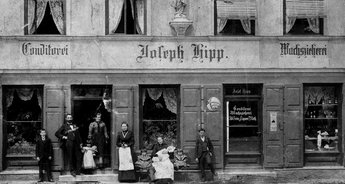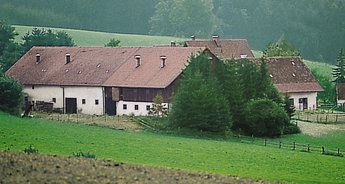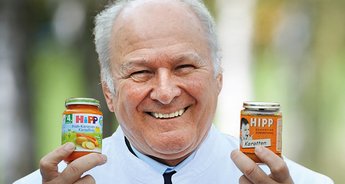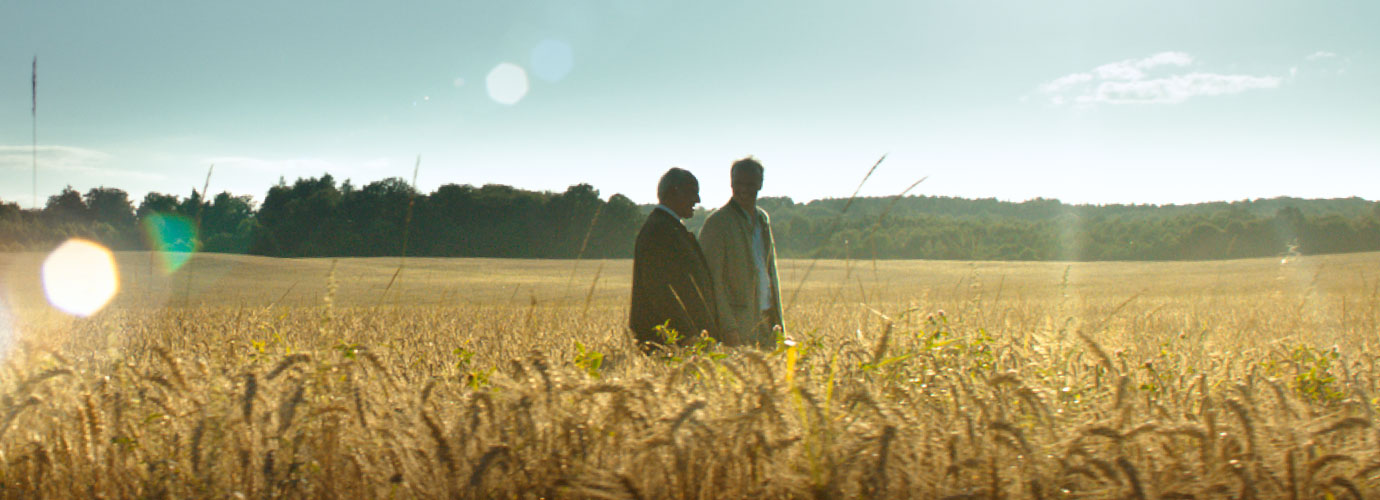History
Every success story starts with a brilliant idea. Our family company started out when Joseph Hipp first produced rusk flour for baby food and sold it in his bakery - the birth of the HiPP baby foods range.
Pfaffenhofen 1899: J. HiPP’s Rusk Flour factory is established

The Hipp family has passed down their love of nature and of their craft from generation to generation. Their forebears made beeswax candles and fine honey gingerbread. At the end of the 19th century, Joseph Hipp, a confectioner in Pfaffenhofen, had an idea that was revolutionary for the time: when his wife had problems nursing their twins, he used hand crushed rusks and milk to make the first baby cereal. News of his success spread, and the yellow and black packages of J. HiPP’s Rusk Flour became an established brand, laying the foundations for the family company. As the popularity of the flour grew, son Georg sold the product from door to door in Munich, until his parents’ premises grew too small and he founded his own company in 1932.
Pfaffenhofen 1956: Georg Hipp becomes a pioneer of organic agriculture

In 1956 Georg Hipp developed a new industrial manufacturing process for baby food in jars. Gradually expanding his product range, he launched HiPP jars in 1959 as a practical, hygienic form of packaging.
An encounter with the Swiss pioneer of organic-biological agriculture, Dr. Hans Müller, inspired him to adopt ecological production methods for fruit and vegetables. The first raw materials for HiPP products were grown on ecologically farmed fields from 1956 onwards. As a first step the family farm, Ehrensberger Hof near Pfaffenhofen, was wholly converted to organic farming.
Pfaffenhofen 1967: Claus Hipp takes over the management of the family company

After the death of Georg Hipp his 29-year-old son Claus took over the management of the company, increasingly broadening his father’s ecological ideas.
While the organic pioneer then had to travel from farm to farm to win farmers over to his vision, HiPP today works with a network of over 6,000 contract farmers and is one of the largest processors of organically produced raw materials. Under the management of the three brothers Claus, Georg and Paulus Hipp, HiPP baby foods grew into one of Germany’s most popular brands and a symbol of entrepreneurial operations in line with ecological, economic and social sustainability. “The best from nature. The best for nature.” became the benchmark against which the growth of the family company and its product range were permanently measured.
Pfaffenhofen today: HiPP is the leader in quality and sustainability

The name of HiPP has stood for ecological agriculture and sustainable values for over 50 years. The company works closely with environmental and ecological organisations, supporting a future free from genetic engineering and playing an active role in the “Biodiversity in Good Company Initiative” to protect biodiversity.
HiPP was the first major European food producer to introduce an EMAS-based environmental management system, and continuously improves its ecobalance. Since the system was implemented in 1995, the company has succeeded in reducing its water consumption by two-thirds and its energy consumption by over one-half. 97 per cent of all waste is now recycled, and the HiPP sites in Germany, Austria and Hungary operate carbon-neutrally even though production has doubled and the company’s product range has expanded to over 260 different products.


